7 Best Wineries in Provence, France
Although you are probably familiar with Provence's reputation, beauty, charm, and importance, let us nevertheless provide a quick introduction. Provence, located in southeast France, is home to some of the most iconic wineries (and wine
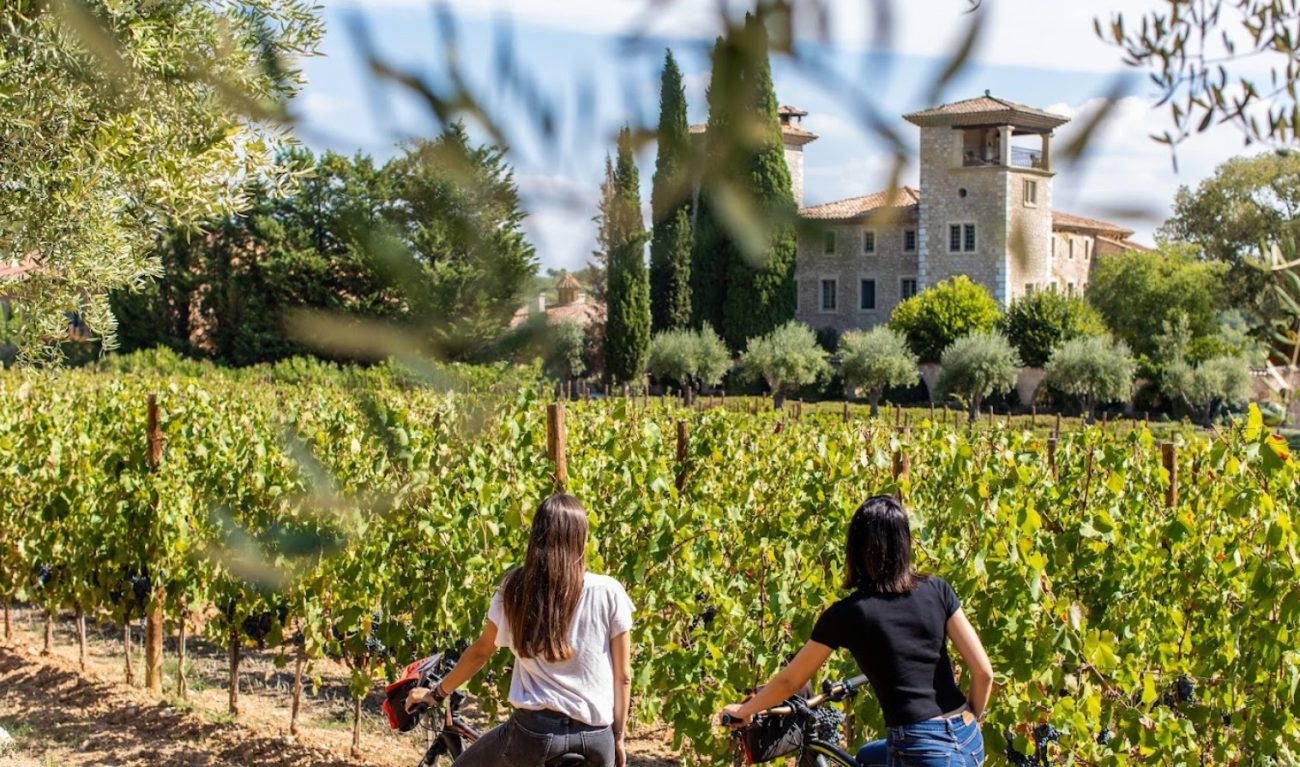
Although you are probably familiar with Provence’s reputation, beauty, charm, and importance, let us nevertheless provide a quick introduction. Provence, located in southeast France, is home to some of the most iconic wineries (and wine tours!) in the country. If you’re considering French wine tours, this region should be at the top of your list. It’s a definite must-visit destination for wine and food lovers. In this article, we will explore some of the best wineries in Provence, including centuries-old châteaux, and of course, the world’s best wines produced in the region.
Best Wineries in Provence
Over the years, we’ve had the pleasure of touring many of its most exquisite wineries. And now, we’re here to share with you our absolute seven favorite spots.
Château de Beaucastel
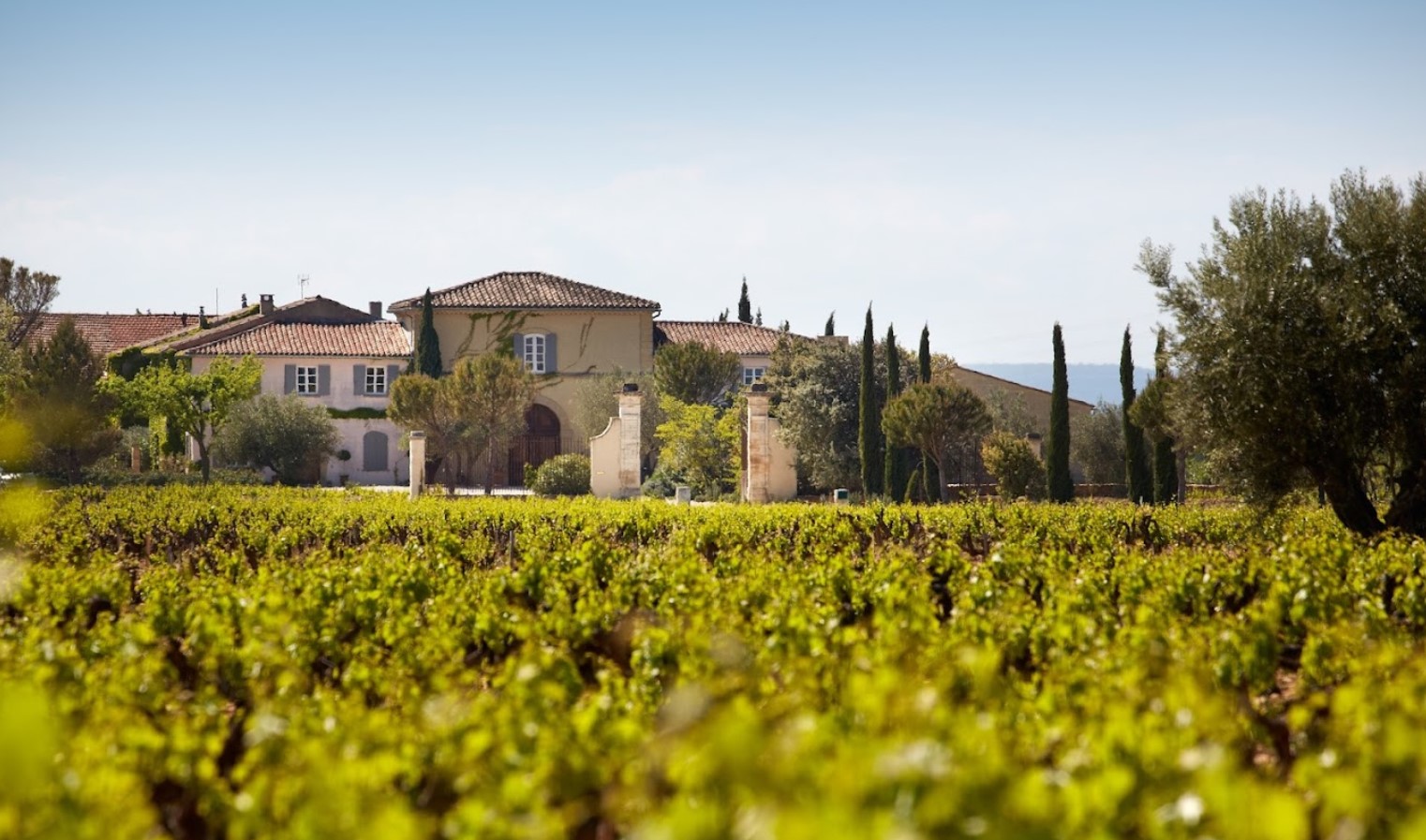
Photo credit: Château de Beaucastel
First on our list is Château de Beaucastel, a winery with a rich history dating back to the 16th century. In 1978, Jacques Perrin took over the estate, and today, the Perrin family manages 100 hectares of vineyards, with three-quarters dedicated to the prestigious AOC Châteauneuf-du-Pape and the remaining quarter to AOC Côtes du Rhône Coudoulet de Beaucastel.
Located in the famed micro-appellation Châteauneuf-du-Pape region, this winery produces some of the most acclaimed and age-worthy wines in the Rhône Valley. With its unique soil composition and the use of organic methods, Château de Beaucastel produces a range of uniquely powerful, structured, elegant wines from 13 permitted grape varieties in AOC.
What Château de Beaucastel wines to try
- Château de Beaucastel Châteauneuf-du-Pape Rouge: This red wine has a deep garnet color and a mouthfeel marked by slightly sweetened aromas and moderately strong tannins. Flavors of cherry, spice, blackcurrant, and blueberry create a rich, peppery finish. It’s a quintessential expression of Beaucastel’s style, offering power and depth.
- Château de Beaucastel Châteauneuf-du-Pape Blanc: This white wine is a full-bodied blend, fresh, with a long, refined finish. It boasts lovely aromas of peach, apricot, anise, and soft spices, ending with a well-balanced touch of yellow peach. It’s a classic Beaucastel, showcasing complexity and elegance.
- Châteauneuf du Pape Roussanne Vieilles Vignes: The Roussanne Vieilles Vignes is the estate’s flagship white, made from old vines and representing the pinnacle of what Beaucastel has to offer in white wine. It’s a rich and complex wine with a beautiful balance, best enjoyed after aging for 4 to 5 years.
- Hommage à Jacques Perrin: The crown jewel of the estate. This is their ultra-premium Châteauneuf-du-Pape, a wine that’s only produced in exceptional vintages, crafted from very old Mourvèdre vines, yielding small quantities of intensely ripe, concentrated fruit. This wine has a deep, dark ruby color and features remarkable aromas of black cherry, cassis, spices, leather, and game. It’s incredibly rich and full-bodied, with an impressive aging potential of at least ten years.
What to do at the Château de Beaucastel winery
- Wine Tasting: Try a range of their wines, from the classic Châteauneuf-du-Pape to more experimental blends.
- Tour the Cellars: Explore the historic cellars where their iconic wines age in large oak foudres.
- Organic and Biodynamic Tour: Learn about their organic and biodynamic farming practices and how they influence the wine.
- Vertical Tasting: If you’re lucky enough, book a vertical tasting to compare different vintages of their renowned wines.
Where to stay & where to dine
Here are our recommendations for accommodations and dining options when visiting Château de Beaucastel.
Château La Coste
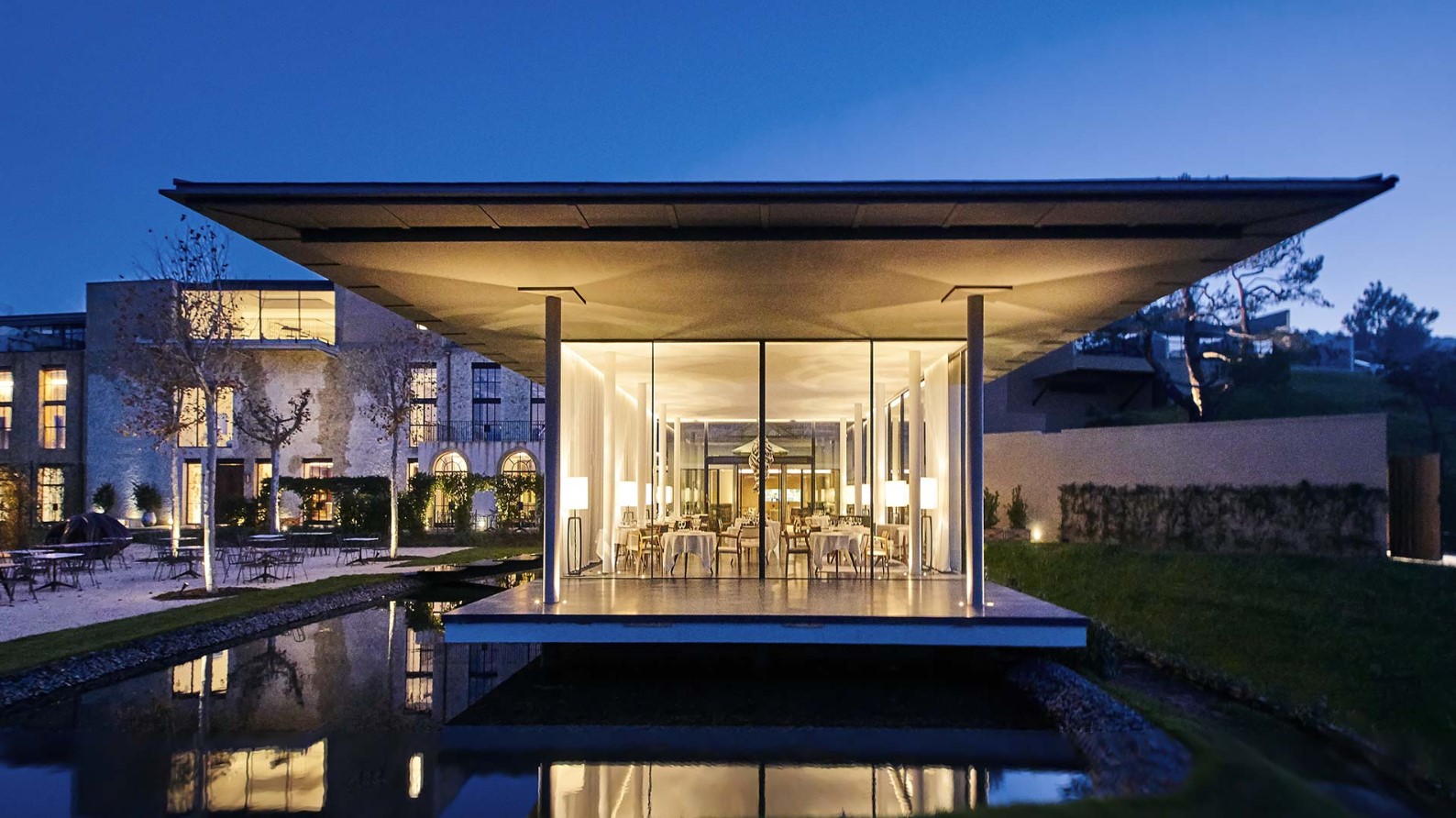
Photo credit: Château La Coste
Château La Coste is a remarkable place that encompasses a sculpture park, an art destination, and an organic winery. Situated in the Var department, this winery is renowned for its striking architecture and top-quality wines.
Set in an extraordinary landscape filled with vineyards, cypress trees, pines, olive trees, and oaks, this estate is truly a Provence embodiment. At the heart of the property lies a charming 17th-century farmhouse, built in the Palladian style in 1682. The estate, set on some 500 acres near Aix-en-Provence, features contemporary art installations by world-renowned artists like Tadao Ando, Ai Weiwei, Frank Gehry. Louise Bourgeois and others.
What Château La Coste wines to try
- Grand Vin Rouge: Elegant and complex wine, with a balanced structure and a long finish featuring notes of blackcurrant and sour cherry.
- Grand Vin Blanc: Fresh and balanced, opens up fresh notes of citrus and white fruit with good volume and a persistent finish marked by a slight salinity.
- Grand Vin Rosé: Expressive aromas of stone fruits like peach and apricot, accompanied by a subtle hint of iodine and anise.
- Maximas: Powerful and well-structured blend of Cabernet Sauvignon, Cabernet Franc, and Malbec. Offers toasty aromas with hints of coffee and licorice on the nose. The palate is smooth and delicate, showcasing flavors of blackberry and blackcurrant. Wine with great aging potential.
What to do at the Château La Coste winery
- Art & Architecture Tour: Explore over 30 art installations scattered across the estate.
- Wine Tasting: Enjoy a tasting in a contemporary glass pavilion, guided by expert sommeliers.
- Dining: Have lunch or dinner at the estate’s gourmet restaurant, Le Restaurant, which is a culinary experience in itself.
Where to stay & where to dine
Here’s the lowdown on the best places to stay and eat near Château La Coste, all laid out in a handy table with descriptions for both accommodations and restaurants.
| Where to Stay | Description | Where to Dine | Description |
|---|---|---|---|
| Villa La Coste | A luxury hotel situated on the vineyard itself. | Le Restaurant | Fine dining at Château La Coste. |
| Les Lodges Sainte-Victoire | A spa hotel offering stunning views of the countryside. | Chez Charlotte | A casual bistro with Provençal dishes. |
| Hotel Cézanne | A stylish boutique hotel in Aix. | La Table de Ventabren | Scenic dining with fresh, local ingredients. |
| Le Pigonnet | A charming hotel with manicured gardens. | Les Petites Tables | A quaint spot for traditional cuisine. |
| Domaine & Cie | A peaceful retreat with modern amenities. | Le Clos de la Violette | Refined French dining with a focus on local produce. |
| Le Mas d’Entremont | Offers both comfort and Provençal charm. | Le Saint-Estève | Michelin-starred restaurant with a contemporary twist. |
| La Maison d’Aix | Perfect for couples looking for a romantic getaway. | Café des Arts | Casual spot with Provençal classics. |
| Les Deux Garçons | A historic Aix hotel with modern rooms. | Le Passage | Cozy and casual with excellent local wines. |
| La Villa Gallici | Opulent luxury in a serene setting. | La Fromagerie du Passage | Ideal for cheese and wine lovers. |
| Hotel Le Concorde | A budget-friendly option near the city center. | L’Alcôve | Traditional French cuisine with a modern edge. |
Domaine de la Citadelle
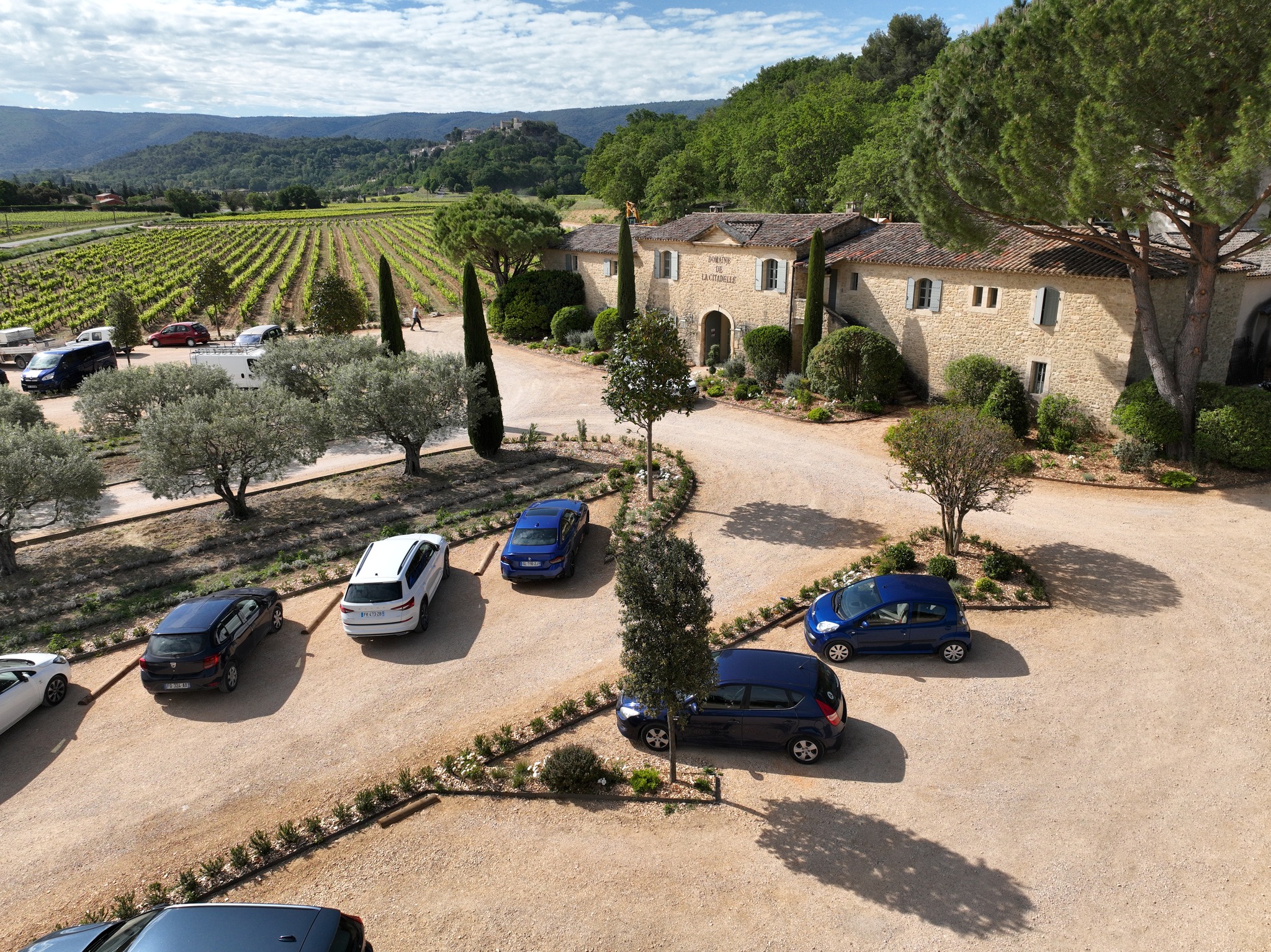
Photo credit: Domaine de la Citadelle
Domaine de la Citadelle is a little off the beaten path, tucked away in the Luberon mountains, but it’s well worth the trip. Located within a beautiful medieval citadel, you can take a tour of the winery and enjoy a tasting of the wines while taking in the stunning views of the surrounding countryside.
Domaine de la Citadelle was founded in 1990 by Yves Rousset-Rouard, transforming a small farm and 8 hectares of land at the foot of the charming village of Ménerbes. Today, under the ownership of Valérie and Yannick Panagiotis, the estate spans 40 hectares and operates with a strong commitment to eco-friendly practices. Since 2016, the vineyards have been farmed organically, and the domaine is certified as a High Environmental Value (HVE) vineyard. They use sustainable techniques like horse plowing, eco-grazing, and even beekeeping to maintain the health of their vineyards.
Beyond its stunning wines, Domaine de la Citadelle is also home to a unique Corkscrew Museum—yes, you read that right. It’s a fun, quirky addition to the winery experience. The estate focuses on organic farming and produces wines that truly reflect the rugged, wild terroir of the Luberon.
What Domaine de la Citadelle wines to try
- Les Ultimes: A rich, powerful red with a blend of Syrah and Cabernet Sauvignon. It offers intense aromas of toast, violets, and dark fruits, with a smooth, balanced finish. This wine has great aging potential of 10+ years.
- Le Gouverneur Saint-Auban Rouge: A beautifully structured red with rich notes of blackberry, cassis, and a touch of licorice. It pairs wonderfully with grilled lamb chops or a hearty beef stew.
- Le Gouverneur Saint-Auban Blanc: A vibrant white made from Chardonnay, Viognier, and Roussanne, offering notes of apricot, peach, and acacia flowers. It’s perfect with truffle scrambled eggs or scallops.
- Les Artèmes Rosé: A refreshing rosé with bright red fruit, citrus, and floral notes, ideal for summer afternoons paired with stuffed tomatoes or Brie de Meaux.
What to do at the Domaine de la Citadelle winery
- Wine Tasting: Sample their excellent selection of wines, including limited releases.
- Dine at the Winery: First up, there’s the Cave à Manger ‘Le Bistrot de La Citadelle’, a casual yet delicious option open from Wednesday to Sunday for lunch and dinner. Then there’s La Table Agricole Tayac, a more exclusive dining space with incredible views of the wine cellar. Open only for lunch from Monday to Friday, this spot offers a farm-to-table menu that highlights the freshest local ingredients.
- Corkscrew Museum: Tour the quirky museum housing over 1,200 corkscrews from all over the world.
- Botanical Garden Tour: Don’t miss out on a stroll through their Botanical Garden, which features aromatic, medicinal, and even carnivorous plants, as well as a truffle oaks.
Where to stay & where to dine
Here’s the information presented in a table with descriptions of the top accommodations and dining options near Domaine de la Citadelle:
| Where to Stay | Description | Where to Dine | Description |
|---|---|---|---|
| La Bastide de Gordes | A luxurious hotel with breathtaking views of the Luberon. | L’Artemise | Contemporary cuisine in a chic setting with a focus on seasonal ingredients. |
| Le Mas des Herbes Blanches | A five-star retreat with an infinity pool and spa. | Le Petit Café | A casual spot with local dishes and stunning views in Oppède-le-Vieux. |
| Domaine de Fontenille | A chic wine estate hotel with a gourmet restaurant. | La Ferme de la Huppe | Traditional Provençal fare with a modern twist. |
| Le Mas de la Rose | A boutique hotel with lush gardens and Provençal charm. | Le Galoubet | A charming bistro with hearty Provençal dishes. |
| Hôtel Les Bories & Spa | A luxurious stay offering a spa and fine dining in Gordes. | L’Auberge de la Loube | A cozy, rustic spot with traditional Provençal cuisine. |
| La Coquillade | A luxury eco-resort and vineyard in the heart of the Luberon. | La Trinquette | Fine dining with a view in Gordes. |
| Le Moulin de Lourmarin | A romantic, historic hotel in a former olive mill. | Le Carillon | A local favorite for casual Provençal food in Goult. |
| Hôtel du Poète | A charming, family-run hotel near Fontaine-de-Vaucluse. | La Table du Moulin | Traditional French fare in a historic setting in Lourmarin. |
| Le Mas des Grès | A cozy, authentic Provençal hotel with a welcoming atmosphere. | Le Vivier | Michelin-starred dining by the river in L’Isle-sur-la-Sorgue. |
| Le Phebus & Spa | A Relais & Châteaux hotel offering luxury and relaxation. | Bistro le 5 | Simple, fresh dishes with a focus on local ingredients in Ménerbes. |
Domaine Tempier
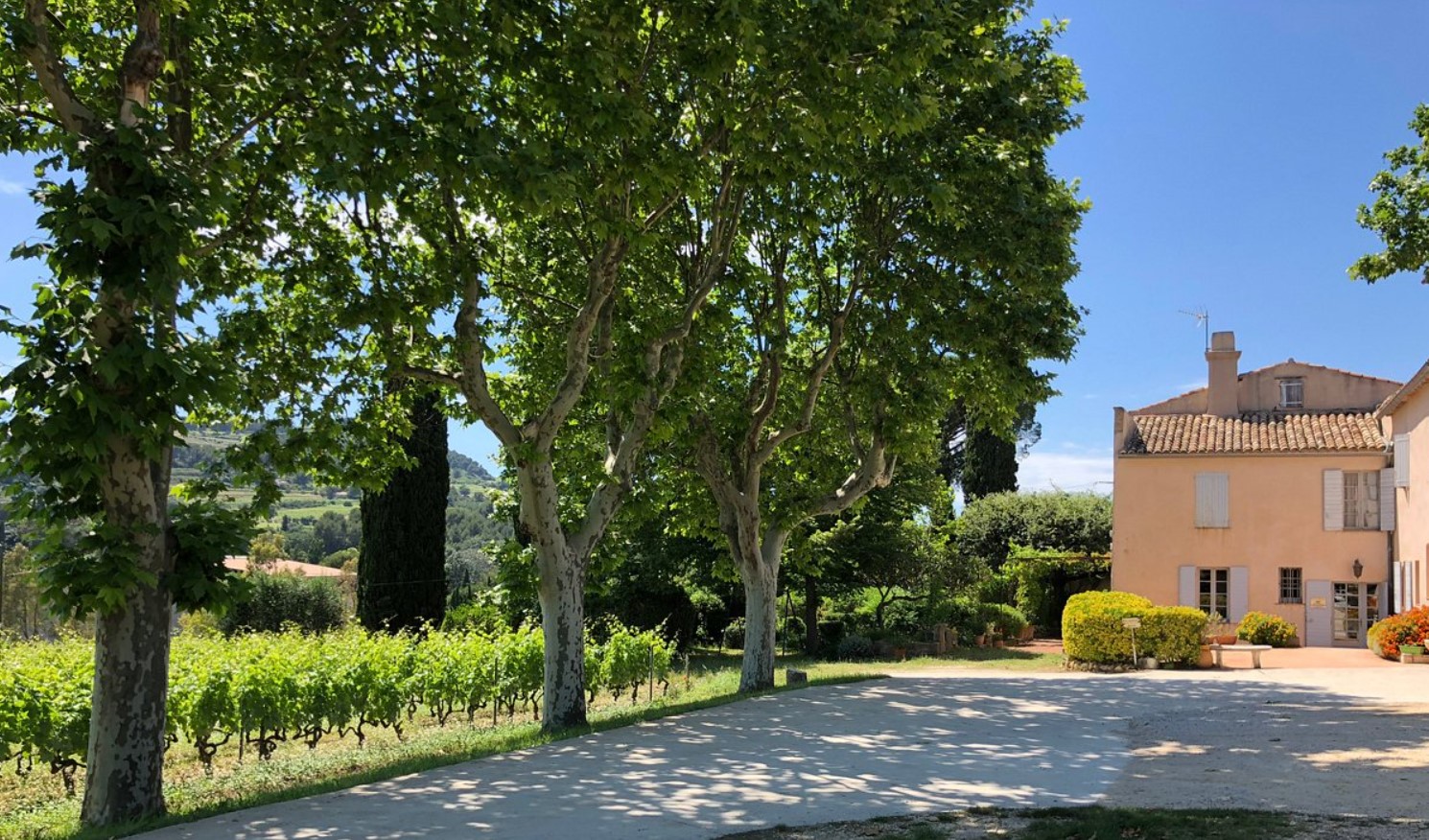
Photo credit: Domaine Tempier
One of the most iconic wineries (and one of our favorites!) in Provence, Domaine Tempier is a family-owned winery producing wine since the 1830s. Located in the Bandol region, this winery is known for its focus on bold, structured reds made from Mourvèdre, and rosé wines. The winery is also known for its commitment to sustainable winemaking practices. The setting is traditional, and intimate, and feels like stepping back in time—this is a place where winemaking is deeply personal and rooted.
At Domaine Tempier, the diversity and complexity of the terroirs are truly remarkable, spreading across 60 hectares of varied soils and landscapes. Each plot, from La Bastide to La Migoua, La Tourtine, and Cabassaou, offers unique geological characteristics and microclimates. These differences, combined with the domain’s old vines, create the distinct personalities of the estate’s four renowned cuvées.
La Bastide is the heart and soul of Domaine Tempier. It’s where the first vines of the Rouinart-Tempier family were planted, making it a site rich in history. Here, Mourvèdre, Grenache, and Cinsault vines thrive on a 7-hectare plot in Le Plan du Castellet, amidst towering cypress trees that stand like ship masts. This vineyard, along with others on the estate, contributes to the famous Cuvée Classique rosé and red wines.
What Domaine Tempier wines to try
- Cuvée Classique: The flagship wine of the estate is a blend of Bandol’s strength with Tempier’s signature elegance and finesse. This cuvée reflects the variety of terroirs found around the estate and beyond. The result is a wine with complexity and depth, shaped by a range of geological features and diverse sun and wind exposures. The Cuvée Classique typically consists of about 75% Mourvèdre, balanced with Grenache, Cinsault, and smaller amounts of Carignan and Syrah.
- Bandol Rosé: An absolute must for rosé lovers, known for its vibrant blend of complexity and freshness. It has a fine structure and no harsh tannins, making it both elegant and approachable. Mourvèdre dominates the blend at around 50%, with Grenache and Cinsault adding balance.
- Cuvée Cabassaou: The Cabassaou Cuvée is a powerhouse wine, coming from a small, walled-in plot at the bottom of La Tourtine, where the vines are shielded from the fierce Mistral wind. Thanks to the warm microclimate and shallow soils, the yields are low but the wine is dense and complex. Predominantly Mourvèdre (92-94%), with a touch of Syrah and Cinsault, this is a bold wine with exceptional aging potential.
- La Migoua: Perched at 300 meters on the Beausset Vieux hillside, La Migoua is a geological marvel. Its complex soil was shaped by an ancient geological event that introduced layers of limestone, dolomite, and other ancient rocks. The scattered plots benefit from a range of sun exposures and are less impacted by the Mistral wind. The La Migoua cuvée showcases the uniqueness of this terroir with a blend of Mourvèdre (55%), Cinsault (25%), Grenache (15%), and Syrah.
What to do at the Domaine Tempier winery
- Wine Tasting: A more intimate experience compared to larger estates, with personalized attention from the staff.
- Vineyard Tour: Explore the terraced vineyards that produce some of the best wines in the Bandol region.
- Winemaker Meet & Greet: If you’re lucky, you might get to meet a member of the Peyraud family, who still runs the estate.
Where to stay & where to dine
We’ve got the information all set up in a table for you, complete with descriptions for accommodations and restaurants near Domaine Tempier.
| Where to Stay | Description | Where to Dine | Description |
|---|---|---|---|
| Hostellerie Bérard & Spa | A charming hotel and spa in nearby La Cadière d’Azur. | La Table du Vigneron | Seasonal dishes paired with local wines. |
| Le Castellet | A luxury hotel with panoramic views and a Michelin-starred restaurant. | Le Goguette | A modern bistro offering creative, local fare. |
| Le Clos de la Chèvre Sud | A romantic B&B with stunning views of the vineyards. | L’Auberge du Port | A classic French restaurant with a focus on fresh seafood. |
| Le Frégate Provence | A golf and spa resort close to the winery. | Le Pied de Nez | A cozy spot for traditional Provençal dishes. |
| Villa Azur Golf | A luxury B&B with modern amenities and an outdoor pool. | La Chipote | Perfect for a laid-back lunch with stunning views of the sea. |
| La Villa Phenix | A private villa rental with easy access to Bandol’s wineries. | Auberge Provençale | Traditional Provençal food in a rustic setting. |
| Le Provençal | A family-run hotel with a cozy, local feel. | Les Saveurs du Sud | A family-run restaurant offering fresh, seasonal dishes. |
| Domaine de Frégate | A vineyard hotel offering comfortable, rustic accommodations. | Le Petit Navire | A local favorite for seafood lovers. |
| Bastide Sainte Anne | A boutique hotel with Provençal charm and modern comforts. | Le Grand Large | Enjoy a meal right on the beach, paired with local wines. |
| Hôtel Ile Rousse Thalazur Bandol | A beachfront hotel with a spa, just a short drive from the winery. | Le Castellaras | Michelin-starred cuisine with stunning views. |
Domaine La Cavale
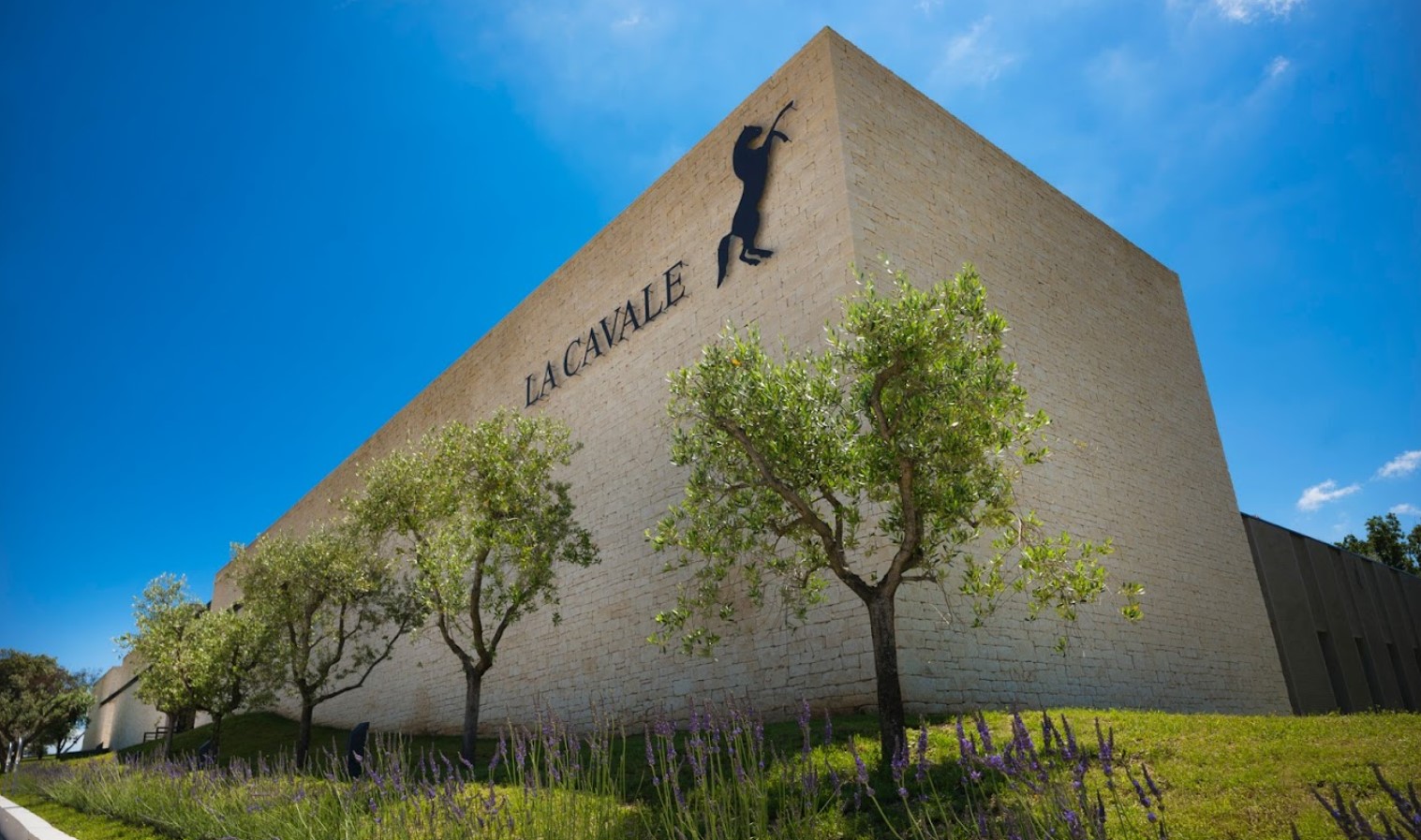
Photo credit: Domaine La Cavale
What Domaine La Cavale wines to try
- Petite Cavale Rouge: 71% Grenache Noir, 16% Carignan, 13% Syrah blend with expressive nose with notes of jammy red fruits like strawberry and raspberry. Fresh and balanced on the palate with soft tannins and a smooth finish.
- Petite Cavale Blanc: 46% Rolle, 30% Ugni Blanc/Clairette, 24% Grenache Blanc blend with citrusy and floral aromas, with flavors of bergamot and nectarine on the palate. A fresh, mineral finish gives it a nice length.
- Petite Cavale Rosé: 95% Cinsault, 5% Grenache Noir blend with a beautiful salmon color with citrus aromas like pink grapefruit. The palate reveals tangy red fruits such as redcurrant, with a refreshing, balanced finish.
What to do at the Domaine La Cavale winery
- Wine Tasting: Enjoy a tasting experience that showcases the unique character of their wines. No reservation is needed, and you’ll be seated at a tasting table where the team will guide you through the various blends, soils, and maturation processes that define each wine. Alongside the wines, you’ll also get to try their three distinctive olive oils, each with its own personality.
- Guided Cellar Tour: Include a behind-the-scenes look at the wine production. The tour ends with a tasting of the full wine range, offering a complete immersion into the world of Domaine La Cavale.
- Visit the Wine Shop: Explore the wine shop, featuring local products, global wines and spirits, or simply relax on the terrace with a glass of wine. Set in the heart of the Luberon vineyard, the terrace offers a peaceful spot to enjoy local delicacies while taking in the picturesque landscape. On Thursday evenings, live music and food trucks create a lively atmosphere, perfect for unwinding with friends.
- Wine Workshops: From an introduction to wine tasting, where you’ll discover how to analyze wine, to the Ampelography workshop where you can learn about grape varieties and even create your own blend. There’s even a Wine and Chocolate workshop for the gourmets! PS. Workshops require a reservation 48 hours in advance.
Where to stay & where to dine
Check out the table below for detailed descriptions of accommodations and restaurants near Domaine La Cavale.
| Where to Stay | Description | Where to Dine | Description |
|---|---|---|---|
| Domaine de Capelongue | A luxury hotel with views of the Luberon mountains. | Le Fournil | Authentic Provençal cuisine in a relaxed setting. |
| Le Clos du Buis | Cozy and charming, located in the nearby town of Bonnieux. | Auberge des Carrières | Local food with an innovative twist. |
| Le Mas des Herbes Blanches | A luxurious retreat set amidst lavender fields. | Bistro de Lourmarin | A casual but delicious bistro experience. |
| La Bastide de Marie | A classic Provençal experience with a vineyard setting. | La Bastide de Marie | Mediterranean dishes crafted from fresh local ingredients. |
| La Coquillade | An upscale hotel with its own vineyard and spa. | L’Atelier L’art des Mets | Great for food and wine pairing. |
| Le Moulin du Lourmarin | A quaint, boutique hotel in a charming village. | Le Vivier | Perfect for seafood lovers, located along the Sorgue River. |
| Hôtel Les Bories | A luxurious escape with a Michelin-starred restaurant on site. | Le Petit Café | Intimate and charming, serving regional cuisine. |
| Le Relais du Luberon | Budget-friendly option with comfortable rooms. | La Table de Xavier Mathieu | For a gourmet dining experience. |
| Château de Sannes | A romantic and luxurious stay with wine-tasting experiences. | L’Arome | Authentic French food with modern touches. |
| Auberge La Fenière | A sustainable hotel and restaurant with local flair. | Café Gaby | Laid-back spot for a casual Provençal meal. |
Château de Berne
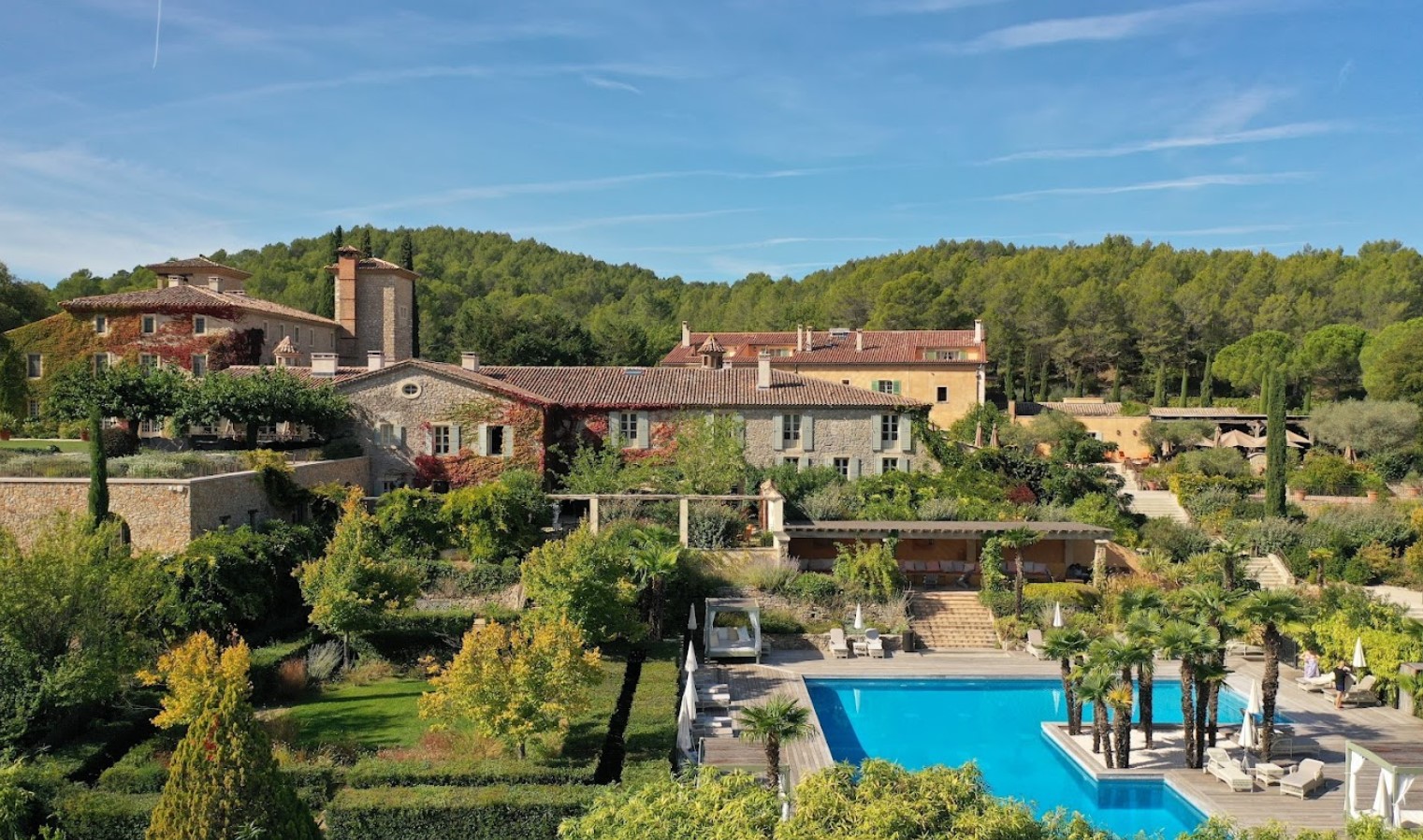
Photo credit: Château de Berne
Château de Berne is a full-blown Provençal experience. Located near the town of Lorgues, this estate offers a completely immersive ranges of experiences: exceptional wines, a luxury hotel, a spa, a Michelin-starred restaurant and so much more. We could easily spend an entire week here without ever leaving the property.
Located on 515 hectares of lush landscape, with 150 hectares dedicated to organic vineyards, Château de Berne offers a sensory journey that starts with its award-winning wines and extends into every aspect of your stay. The estate’s signature square bottle has become an icon in the wine world. The vineyard benefits from the unique terroir of the Triassic plateau, protected by 350 hectares of forest.
What Château de Berne wines to try
- Rosé Émotion: Blend of Grenache Noir, Cinsault, Syrah. A fresh and fruity rosé with a pale peach-pink hue. The nose offers vibrant aromas of ripe stone fruits, leading to a round and flavorful palate where nectarine dominates. Perfectly balanced and refreshing, an excellent choice for aperitifs.Rosé Inspiration: Organic blend of Grenache Noir, Cinsault, Syrah, Carignan with a beautiful pale peach color. This wine offers a delicate nose of ripe stone fruits. On the palate, it’s well-balanced with notes of white fruits and red berries like strawberries and currants. A smooth and expressive rosé that captures the essence of Provence’s limestone terroirs.
- Château de Berne Grande Cuvée: Red blend of Syrah, Cabernet Sauvignon. This iconic red showcases a deep garnet color with purple highlights. The nose is expressive with aromas of ripe black fruits, spices like pepper, and floral hints of violet. Aged 12 months in oak barrels, the wine offers a silky palate with rich black cherry and plum flavors, complemented by well-integrated tannins. The finish is long, with elegant notes of fruit and wood.
What to do at the Château de Berne winery
- Culinary Experiences: Led by Michelin-starred Chef Louis Rameau, the gastronomy at Château de Berne is a tribute to Provence’s vibrant flavors. The estate features several dining options, each offering a unique twist on local cuisine. Le Jardin de Berne, the Michelin-starred restaurant, showcases seasonal dishes crafted from ingredients grown right on the estate. For a more casual experience, you can visit Le Bistrot, which serves rustic Provençal fare in a cozy setting adjacent to the wine cellar.
- Luxury Accommodation: The Château de Berne is also home to an elegant 5-star hotel, offering 34 rooms and villas with breathtaking views of the vineyards. Each space is designed with the utmost attention to comfort and Provencal charm, blending traditional architecture with modern amenities. For those looking for an even more exclusive experience, the private villas are a perfect choice.
- Wellness and Activities: Beyond wine and food, Château de Berne offers a variety of activities to rejuvenate both body and soul. The Cinq Mondes Spa is an 800 m² sanctuary of wellness, featuring treatments inspired by vinotherapy, yoga sessions in the vineyard, and tranquil spaces for relaxation. For the more adventurous, there are hiking trails, tennis courts, and electric bike rentals to explore the expansive estate.
- Events and Celebrations: Whether you’re planning a wedding, a corporate seminar, or a personal celebration, Château de Berne provides an idyllic backdrop. With refined event spaces both indoors and out, this estate is a popular destination for hosting memorable occasions.
Where to stay & where to dine
Here’s all the info neatly organized in a table with descriptions for both accommodations and restaurants in case you decide to dine and stay near Château de Berne:
| Where to Stay | Description | Where to Dine | Description |
|---|---|---|---|
| Château de Berne Hotel | Stay on-site for the full wine-and-wellness experience. | Le Jardin de Berne | The estate’s Michelin-starred restaurant, offers fine dining in an idyllic setting. |
| Le Mas Pinède | A charming guesthouse with a Provençal feel. | La Bastide des Magnans | Traditional Provençal cuisine with a modern twist. |
| Villa La Licorne | A luxurious villa rental for a more private experience. | Le Chrissandier | A cozy spot in Lorgues known for its fresh, seasonal dishes. |
| La Bastide des Selves | A cozy B&B with a vineyard view. | Brasserie Chez Bruno | Famous for its truffle specialties. |
| Le Domaine de la Baume | A romantic, luxury hotel nearby. | Bistrot Gourmand | A laid-back bistro offering local cuisine. |
| L’Orée du Bois | A simple, comfortable hotel perfect for exploring the region. | La Table du Château de Berne | Farm-to-table dishes made with local ingredients. |
| Le Logis du Guetteur | A medieval castle-turned-hotel with lots of character. | Auberge du Parc | A rustic spot with excellent traditional fare. |
| Domaine de l’Enclos | A stylish, eco-friendly guesthouse. | Le Bistrot de Lorgues | Simple, hearty meals in a relaxed setting. |
| Le Collet des Redons | A tranquil retreat surrounded by nature. | Chez Vincent | Mediterranean-inspired dishes using local produce. |
| La Bastide du Clos | An intimate B&B with personal service. | L’Hostellerie des Gorges de Pennafort | A Michelin-starred restaurant just a short drive away. |
Château d’Esclans
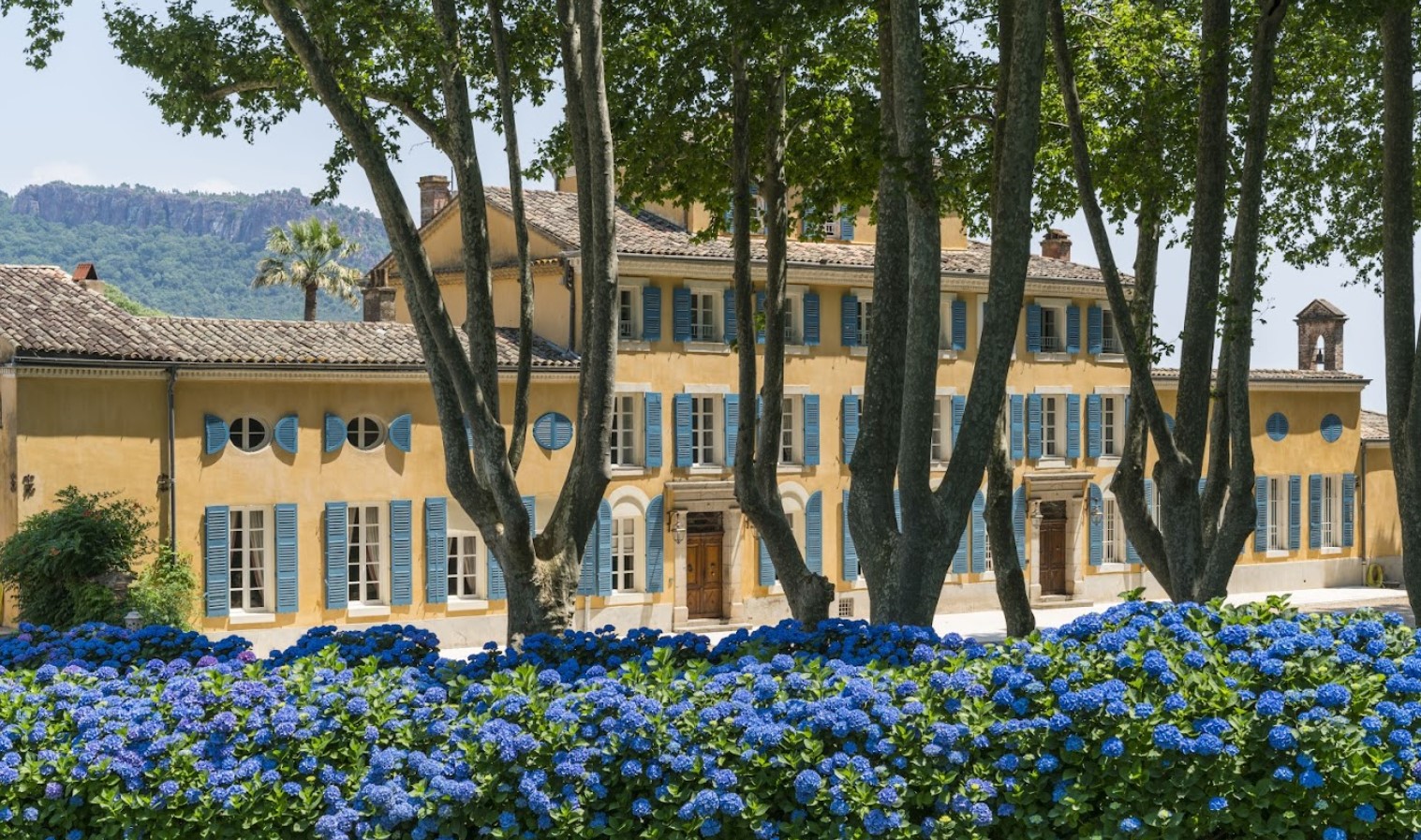
Photo credit: Château d’Esclans
Château d’Esclans near the ancient Roman city of Fréjus on the Mediterranean coast, has built a reputation as one of the premier producers of rosé in the world, and if you’ve ever had a glass of Garrus, you’re already familiar with their masterpiece. Like their rosés, this stunning estate feels like the epitome of French elegance.
Perched at an elevated altitude, the estate enjoys a unique microclimate, perfect for growing some of the finest grapes in Provence. The current château was constructed in the 19th century, modeled after a Tuscan villa, blending Mediterranean charm with European sophistication.
The story of modern winemaking at Château d’Esclans began in 1994 when a Swedish retiree purchased the property and embarked on small-scale wine production. However, it wasn’t until 2006, when Sacha Lichine acquired the estate, that Château d’Esclans rose to international prominence. Lichine, a visionary in the world of wine, was determined to elevate rosé wines to the level of world-class prestige previously reserved for premium whites and reds. His mission led to the “rosé renaissance,” positioning Château d’Esclans as a pioneer in crafting luxurious and complex rosé wines.
Today, the estate spans 44 acres of vineyards, with Grenache as the predominant grape, some vines being over 90 years old. In addition to Grenache, the vineyards cultivate Vermentino, Cinsault, Merlot, Mourvèdre, Syrah, and Tibouren, all benefiting from the limestone-rich soils and the estate’s ideal growing conditions.
What Château d’Esclans wines to try
- Garrus: One of the flagship wines from the estate. Though it presents as a traditional Provençal rosé with a delicate blush hue, its rich bouquet and intense flavors reveal a more complex, Burgundian-like character. The wine is crafted from carefully selected grapes, primarily Grenache from almost 100-year-old vines, along with Vermentino and a touch of Syrah. Fermented in 600-liter French oak barrels and aged for 10-12 months using the “batonnage” method, Garrus develops layers of complexity. With notes of ripe peaches, dried citrus, spices, and vanilla, it delivers a full-bodied, creamy texture with a long, elegant finish.
- Whispering Angel: One of the most famous rosés from Provence. Pale pink with delicate aromas of strawberry, grapefruit, and peach, this rosé is both complex and refreshing. Its minerality and crisp acidity make it versatile, pairing perfectly with summer salads, salmon carpaccio, or grilled shrimp.
- Rock Angel: Another refined rosé from Château d’Esclans. With a pale pink color and aromas of red berries, nectarine, and citrus, Rock Angel is more structured and full-bodied, with a hint of salinity on the finish. Partially barrel-fermented, this wine pairs wonderfully with white meats, fish, and creamy pasta dishes.
What to do at the Château d’Esclans winery
- Wine Tasting: Explore the nuances of their world-class rosés in a guided tasting session.
- Estate Tour: Learn about the history of Château d’Esclans and how they’ve revolutionized the rosé industry.
- Private Picnics: Opt for a luxe vineyard picnic featuring local gourmet fare paired with a chilled bottle of Whispering Angel.
- Rosé Masterclass: If you’re serious about rosé, book a spot in their masterclass to dive deeper into the art of rosé making.
Where to stay & where to dine
Here’s the info laid out in a table with descriptions of places to stay and restaurants near Château d’Esclans:
| Where to Stay | Description | Where to Dine | Description |
|---|---|---|---|
| Château de Berne | A luxury hotel and spa, surrounded by its own vineyards. | La Vague d’Or | A Michelin-starred restaurant with creative cuisine in Saint-Tropez. |
| Le Mas de Pierre | A gorgeous Provençal hideaway with lush gardens and a top-notch restaurant. | L’Olive | Mediterranean-inspired cuisine with a focus on fresh, local ingredients. |
| Villa Belrose | An elegant five-star hotel in nearby Saint-Tropez. | Le Château de Berne Restaurant | An award-winning fine dining experience in a vineyard setting. |
| Le Bastide de Tourtour | A boutique hotel with panoramic views and Mediterranean charm. | Chez Bruno | Famous for its truffle-infused dishes. |
| Château Saint-Martin & Spa | A five-star hotel with a luxurious spa and fine dining options. | Les Saveurs de Provence | A local bistro offering classic Provençal fare. |
| La Bastide Saint Antoine | A stunning Relais & Châteaux property near Grasse. | La Table de Fanette | A cozy spot for creative French dishes using seasonal ingredients. |
| Hôtel Byblos Saint-Tropez | Iconic, glamorous hotel with the best of Saint-Tropez at your doorstep. | Le Relais des Moines | A Michelin-starred spot with inventive French cuisine. |
| Le Château des Demoiselles | A boutique wine estate offering intimate accommodations. | Auberge des Adrets | Rustic and charming, with traditional Provençal dishes. |
| Le Bailli de Suffren | A beachfront hotel in the Gulf of Saint-Tropez, perfect for mixing wine and seaside relaxation. | Restaurant La Truffière | An homage to truffle-based cuisine, perfect with rosé. |
| Hostellerie Le Baou | A chic hotel located near the vineyards. | Le Bistrot de Lorgues | Laid-back dining with a focus on local, farm-to-table ingredients. |
Final Thoughts
Provence offers so much more than just great wine. It’s a blend of culture, nature, and gastronomy. Each of these wineries has its own unique charm and flavor, and visiting them is an experience you won’t forget. Whether you’re sipping rosé under the Provençal sun or pairing a bold red with a Michelin-star meal, Provence will capture your heart (and taste buds) just as it did mine.
PS: If you want more recommendations, take a look at our article on the top wineries in the Rhone Valley. If you’re into Champagne or Bordeaux, check out our article on the best wine tours in Champagne (Reims and Epernay) and our guide to the top Champagne brands. You can also explore our suggestions for the best wine tours in Bordeaux.
Cheers to the next Provençal insipred wine adventure!

